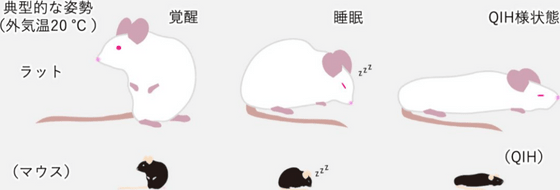Succeeded in 'forced hibernation of mice' experiment, one step forward to realize artificial hibernation of humans

by
A research group at the University of Tsukuba has announced that it has succeeded in stimulating the mouse brain to bring it closer to hibernation. The success of this experiment, which artificially hibernates animals that normally do not hibernate, is expected to realize 'artificial hibernation' that even humans can hibernate, and can be applied to space development, medical treatment, and technologies that delay aging.
A discrete neuronal circuit induces a hibernation-like state in rodents | Nature
https://www.nature.com/articles/s41586-020-2163-6
Discovery of a new neural circuit that induces hibernation-A major step toward the realization of artificial hibernation --- TSUKUBA JOURNAL
https://www.tsukuba.ac.jp/journal/medicine-health/20200611180052.html
Scientists trigger hibernation in mice, astronauts could be next --UPI.com
https://www.upi.com/Science_News/2020/06/12/Scientists-trigger-hibernation-in-mice-astronauts-could-be-next/1061591973094/
Reptiles such as snakes and turtles, and some mammals such as bears hibernate when winter comes when food is low. Since the amount of energy and oxygen required for survival is greatly reduced during hibernation, if artificial hibernation of humans is realized, in addition to SF-like applications such as reducing the load of manned spacecraft and enabling interstellar flight, It is also expected to be used in medical fields such as increasing the survival rate of patients undergoing emergency transportation due to trauma or illness, and delaying the progression of aging and illness.
However, little is known about the mechanism by which animals hibernate. One of the reasons is that experimental animals such as mice and rats do not hibernate, making it very difficult to observe animals during hibernation. Meanwhile, a research group led by Professor Takeshi Sakurai , a doctor of medicine at the University of Tsukuba and a leading expert in sleep research, succeeded in identifying a new neural circuit that can induce a mouse to a state similar to hibernation. ..
When the research group stimulated a group of nerve cells in the hypothalamus of the mouse brain, the body temperature of the mouse dropped significantly over several days, and metabolism was also very low. The research group named this group of nerve cells Q nerves (Quiescence-inducing neurons), and the hibernation-like state generated by stimulating the Q nerves QIH (Q neuron-induced hypometabolism).
Mice with QIH (right) had little movement for several days and their body temperature dropped significantly, but no abnormalities were seen in their bodies after repeated recovery from QIH. From this, the research group believes that 'QIH is a state close to the safe hibernation that wild animals perform in nature.'

by University of Tsukuba
When the research group investigated the mechanism of QIH using neuroscientific methods, it was found that 'QIH is caused by the Q nerve sending the neurotransmitter glutamate to the dorsomedial hypothalamus nucleus.' I understand.

by University of Tsukuba
Furthermore, when the research group stimulated the Q nerve of a rat, which is 10 times larger than a mouse and is an animal that does not hibernate like a mouse, the rat also became in a QIH state. Since the mechanism by which the Q nerves of mice and rats are excited is common to many mammals including humans, the research group said, 'Many creatures including humans have Q nerves and function in the same way. Isn't it? '

by University of Tsukuba
On his site , co-author of the paper, Genshiro Sunagawa , said, 'I think that the most effective use of artificial hibernation is medical treatment. It saves patients whose prognosis deteriorates over time by gaining time through artificial hibernation. I hope we can do it. We hope that our achievements will advance the research and development of artificial hibernation. '
'In the future, we may be able to hibernate human astronauts for missions to Mars and beyond,' Sakurai told U.S. news media UPI news agency. talked.
Related Posts:







